
rtp-llm
RTP-LLM: Alibaba's high-performance LLM inference engine for diverse applications.
Stars: 869
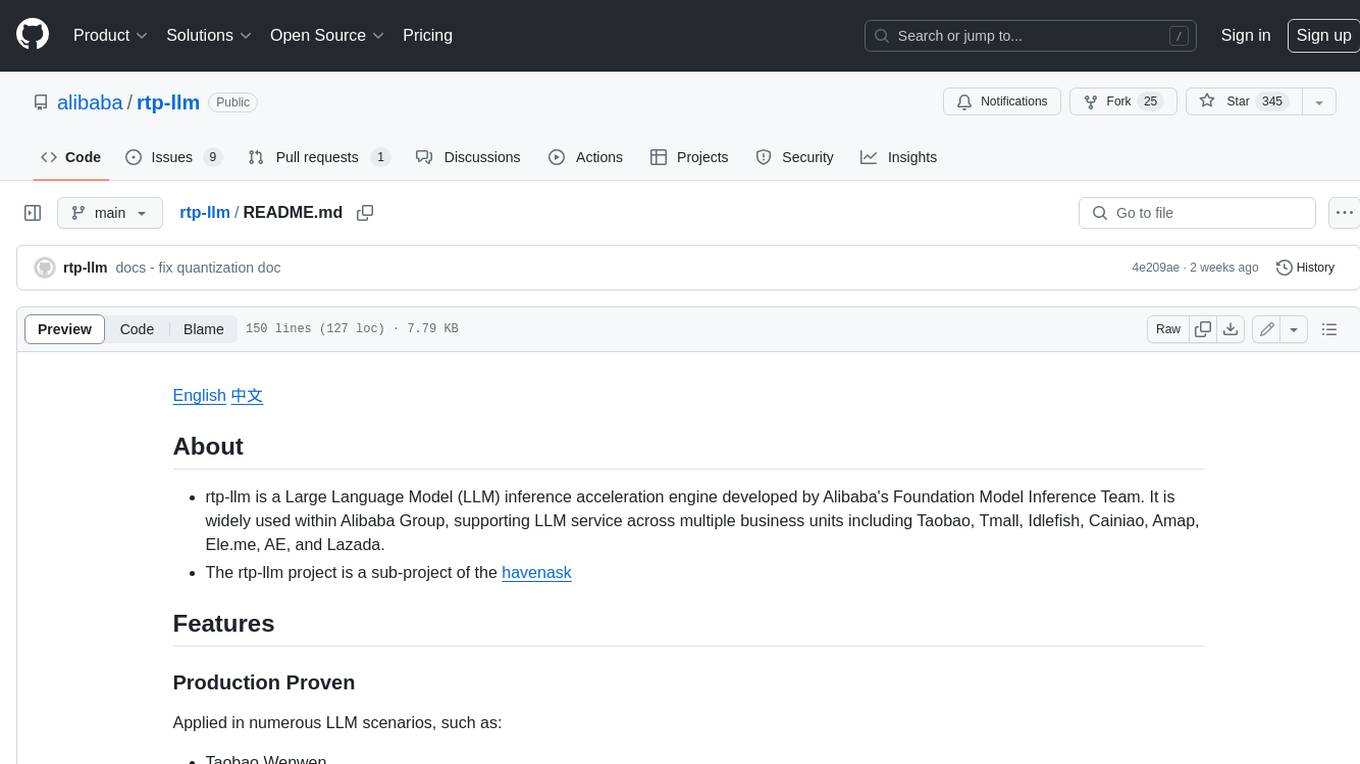
**rtp-llm** is a Large Language Model (LLM) inference acceleration engine developed by Alibaba's Foundation Model Inference Team. It is widely used within Alibaba Group, supporting LLM service across multiple business units including Taobao, Tmall, Idlefish, Cainiao, Amap, Ele.me, AE, and Lazada. The rtp-llm project is a sub-project of the havenask.
README:
- [2025 / 09] RTP-LLM 0.2.0 release.
- [2025 / 01] RTP-LLM now releases the latest code with support for Prefill/Decode seperation, as well as a detailed technical report.
- [2025 / 01] Check below for our latest technical reports !
- [2025 / 01] Qwen series model and bert embedding model are now supported on Yitian ARM CPU.
- [2024 / 06] We are releasing a brand new version of rtp-llm, which features scheduling and batching framework refactored in c++, complete gpu memory management and allocation track and new Device backend. Check release info for more details !
- [2024 / 06] We are currently working on support for multiple hardware backends in extensive collaborations with hardware manufacturers. AMD ROCm, Intel CPU and ARM CPU support are on their way, stay tuned for upcoming releases!
Check below for series of public technical reports released by RTP-LLM team.
- 大模型推理新突破:分布式推理技术探索与实践
- 为异构推理做好准备:次世代 RTP-LLM 推理引擎设计分享
- LLM推理加速:decode阶段的Attention在GPU上的优化
- LLM推理加速:decode阶段的Attention在GPU上的优化(二)
- rtp-llm is a Large Language Model (LLM) inference acceleration engine developed by Alibaba's Foundation Model Inference Team. It is widely used within Alibaba Group, supporting LLM service across multiple business units including Taobao, Tmall, Idlefish, Cainiao, Amap, Ele.me, AE, and Lazada.
- The rtp-llm project is a sub-project of the havenask
Applied in numerous LLM scenarios, such as:
- Taobao Wenwen
- Alibaba's international AI platform, Aidge
- OpenSearch LLM Smart Q&A Edition
- Large Language Model based Long-tail Query Rewriting in Taobao Search
- Utilizes high-performance CUDA kernels, including PagedAttention, FlashAttention, FlashDecoding, etc.
- Implements WeightOnly INT8 Quantization with automatic quantization at load time; Support WeightOnly INT4 Quantization with GPTQ and AWQ
- Adaptive KVCache Quantization
- Detailed optimization of dynamic batching overhead at the framework level
- Specially optimized for the V100 GPU
- Seamless integration with the HuggingFace models, supporting multiple weight formats such as SafeTensors, Pytorch, and Megatron
- Deploys multiple LoRA services with a single model instance
- Handles multimodal inputs (combining images and text)
- Enables multi-machine/multi-GPU tensor parallelism
- Supports P-tuning models
- Loads pruned irregular models
- Contextual Prefix Cache for multi-turn dialogues
- System Prompt Cache
- Speculative Decoding
- Operating System: Linux
- Python: 3.10
- NVIDIA GPU: Compute Capability 7.0 or higher (e.g., RTX20xx, RTX30xx, RTX40xx, V100, T4, A10/A30/A100, L4, H100, etc.)
- docker
cd rtp-llm/docker
# IMAGE_NAME =
# if cuda11: registry.cn-hangzhou.aliyuncs.com/havenask/rtp_llm:deploy_image_cuda11
# if cuda12: registry.cn-hangzhou.aliyuncs.com/havenask/rtp_llm:deploy_image_cuda12
sh ./create_container.sh <CONTAINER_NAME> <IMAGE_NAME>
sh CONTAINER_NAME/sshme.sh
cd ../
# start http service
TOKENIZER_PATH=/path/to/tokenizer CHECKPOINT_PATH=/path/to/model MODEL_TYPE=your_model_type FT_SERVER_TEST=1 python3 -m rtp_llm.start_server
# request to server
curl -XPOST http://localhost:8088 -d '{"prompt": "hello, what is your name", "generate_config": {"max_new_tokens": 1000}}'- whl
# Install rtp-llm
cd rtp-llm
# For cuda12 environment, please use requirements_torch_gpu_cuda12.txt
pip3 install -r ./open_source/deps/requirements_torch_gpu.txt
# Use the corresponding whl from the release version, here's an example for the cuda11 version 0.1.0, for the cuda12 whl package please check the release page.
pip3 install rtp_llm-0.1.9+cuda118-cp310-cp310-manylinux1_x86_64.whl
# start http service
cd ../
TOKENIZER_PATH=/path/to/tokenizer CHECKPOINT_PATH=/path/to/model MODEL_TYPE=your_model_type FT_SERVER_TEST=1 python3 -m rtp_llm.start_server
# request to server
curl -XPOST http://localhost:8088 -d '{"prompt": "hello, what is your name", "generate_config": {"max_new_tokens": 1000}}'-
libcufft.so
Error log:
OSError: libcufft.so.11: cannot open shared object file: No such file or directoryResolution: Please check whether cuda and rtp-llm versions are matched
-
libth_transformer.so
Error log:
OSError: /rtp-llm/rtp_llm/libs/libth_transformer.so: cannot open shared object file: No such file or directoryResolution: If installed via whl or docker(which means not a bazel build), please check your current directory is not rtp-llm, or python will use relative path package instead of installed whl
-
Bazel build time out
Error log:
ERROR: no such package '@pip_gpu_cuda12_torch//': rules_python_external failed: (Timed out)Resolution:
- change pip mirror repository in open_source/deps/pip.bzl, add extra_pip_args=["--index_url=xxx"]
- pip install requirements manually, especially for pytorch, for that bazel build has a 600s timeout by default, which may not be enough for pytorch downloading
-
Curl error Error log:
thread '<unnamed>' panicked at 'index out of bounds: the len is 1 but the index is 1', /root/.cargo/registry/src/github.com-1ecc6299db9ec823/regex-1.8.1/src/dfa.rs:1415:45Resolution: upgrade tiktoken to 0.7.0
- Test in Deploy Docker
- Serving Example
- RWKV-Runner Example
- Python Library Example
- Using RTP-LLm in Aliyun Ecs
- Configuration Parameters
- Source Code Build
- Request Format
- Multi GPU Inference
- LoRA
- PTuning
- SystemPrompt
- ReuseKVCache
- Multimodal
- Embedding/Reranker Model Deployment
- Structured Pruning
- Quantization
- Speculative Sampling
- MultiFrontendServer
- Roadmap
- Contributing
- Benchmark&Performance
- Update whl Deps
Our project is mainly based on FasterTransformer, and on this basis, we have integrated some kernel implementations from TensorRT-LLM. FasterTransformer and TensorRT-LLM have provided us with reliable performance guarantees. Flash-Attention2 and cutlass have also provided a lot of help in our continuous performance optimization process. Our continuous batching and increment decoding draw on the implementation of vllm; sampling draws on transformers, the multimodal part integrating implementations from llava and qwen-vl. We thank these projects for their inspiration and help.
- Taobao Wenda
- Alibaba's International AI Platform Aidge
- OpenSearch LLM Smart Q&A Edition
- Large Language Model based Long-tail Query Rewriting in Taobao Search
- Aquila and Aquila2 (BAAI/AquilaChat2-7B, BAAI/AquilaChat2-34B, BAAI/Aquila-7B, BAAI/AquilaChat-7B, etc.)
- Baichuan and Baichuan2 (baichuan-inc/Baichuan2-13B-Chat, baichuan-inc/Baichuan-7B)
- Bloom (bigscience/bloom, bigscience/bloomz)
- ChatGlm (THUDM/chatglm2-6b, THUDM/chatglm3-6b, GLM4, etc)
- Falcon (tiiuae/falcon-7b, tiiuae/falcon-40b, tiiuae/falcon-rw-7b, etc.)
- GptNeox (EleutherAI/gpt-neox-20b)
- GPT BigCode (bigcode/starcoder, bigcode/starcoder2)
- LLaMA and LLaMA-2 (meta-llama/Llama-2-7b, meta-llama/Llama-2-13b-hf, meta-llama/Llama-2-70b-hf, lmsys/vicuna-33b-v1.3, 01-ai/Yi-34B, xverse/XVERSE-13B, etc.)
- MPT (mosaicml/mpt-30b-chat, etc.)
- Phi (microsoft/phi-1_5, etc.)
- Qwen (Qwen, Qwen1.5, Qwen2, etc.)
- InternLM (internlm/internlm-7b, internlm/internlm-chat-7b, etc.)
- Gemma (google/gemma-it, etc)
- Mixtral (mistralai/Mixtral-8x7B-v0.1, etc)
- LLAVA (liuhaotian/llava-v1.5-13b, liuhaotian/llava-v1.5-7b)
- Qwen-VL (Qwen/Qwen-VL)
For Tasks:
Click tags to check more tools for each tasksFor Jobs:
Alternative AI tools for rtp-llm
Similar Open Source Tools

rtp-llm
**rtp-llm** is a Large Language Model (LLM) inference acceleration engine developed by Alibaba's Foundation Model Inference Team. It is widely used within Alibaba Group, supporting LLM service across multiple business units including Taobao, Tmall, Idlefish, Cainiao, Amap, Ele.me, AE, and Lazada. The rtp-llm project is a sub-project of the havenask.
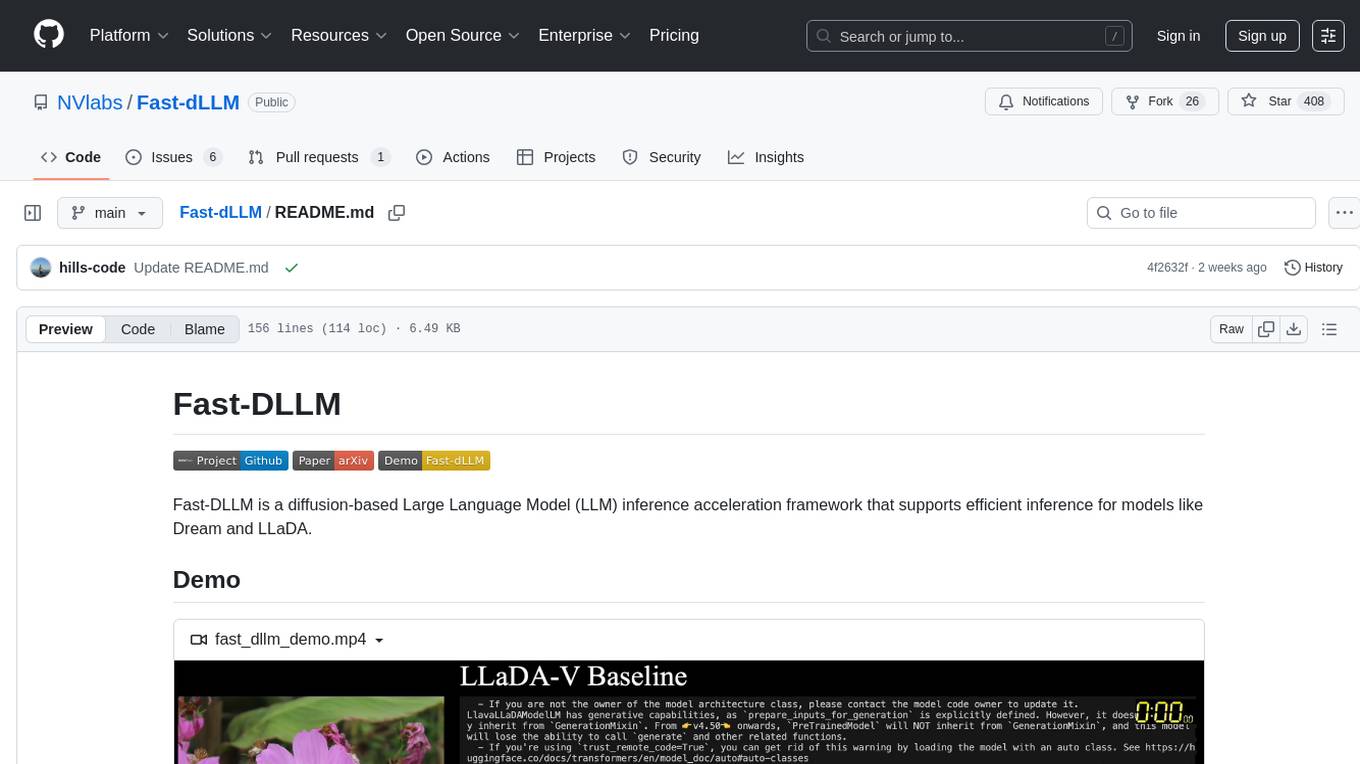
Fast-dLLM
Fast-DLLM is a diffusion-based Large Language Model (LLM) inference acceleration framework that supports efficient inference for models like Dream and LLaDA. It offers fast inference support, multiple optimization strategies, code generation, evaluation capabilities, and an interactive chat interface. Key features include Key-Value Cache for Block-Wise Decoding, Confidence-Aware Parallel Decoding, and overall performance improvements. The project structure includes directories for Dream and LLaDA model-related code, with installation and usage instructions provided for using the LLaDA and Dream models.
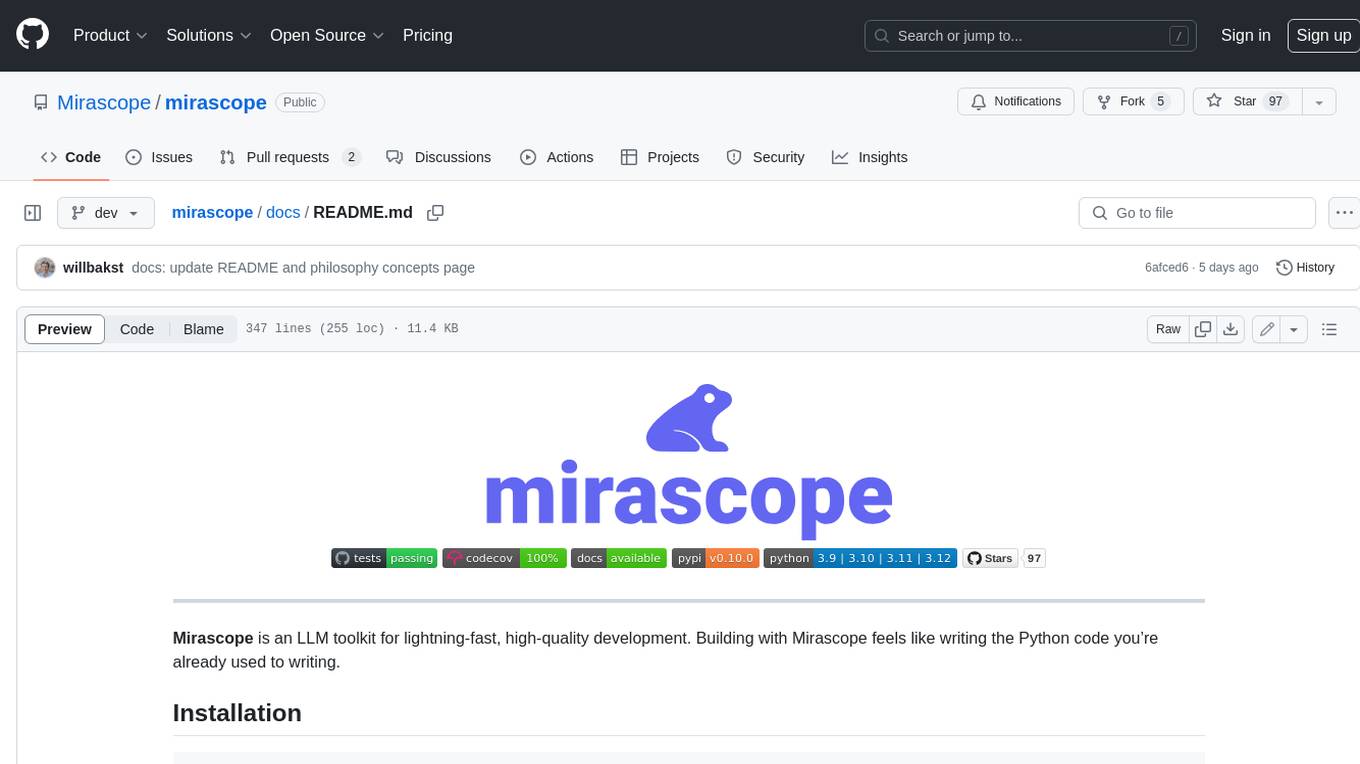
mirascope
Mirascope is an LLM toolkit for lightning-fast, high-quality development. Building with Mirascope feels like writing the Python code you’re already used to writing.
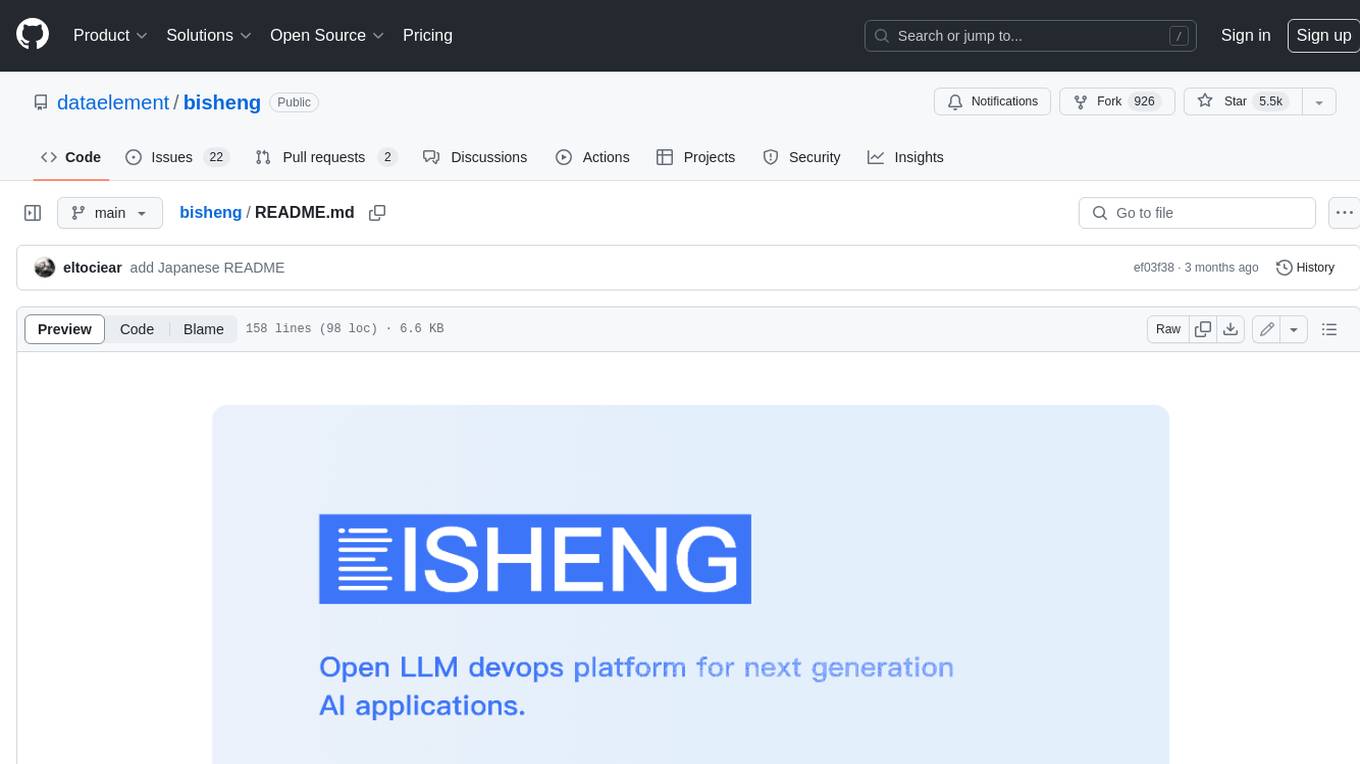
bisheng
Bisheng is a leading open-source **large model application development platform** that empowers and accelerates the development and deployment of large model applications, helping users enter the next generation of application development with the best possible experience.
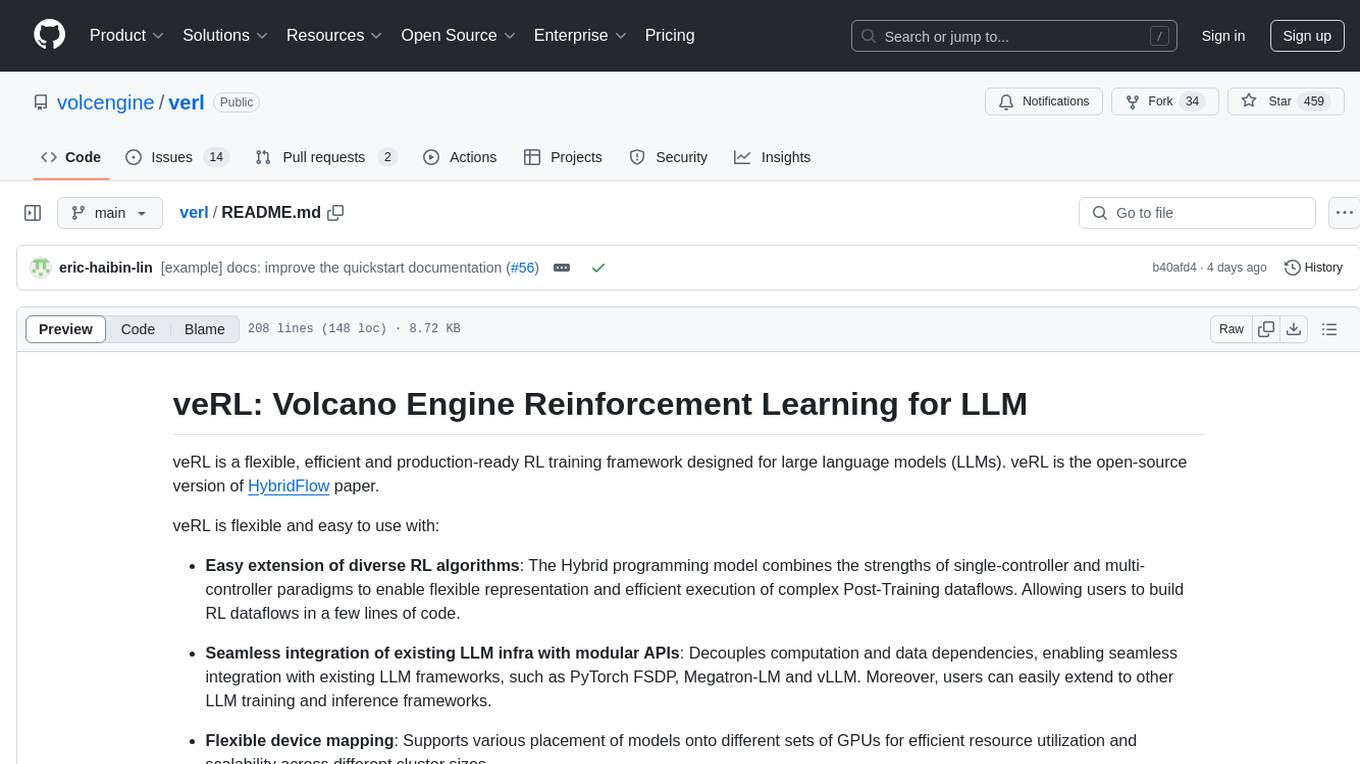
verl
veRL is a flexible and efficient reinforcement learning training framework designed for large language models (LLMs). It allows easy extension of diverse RL algorithms, seamless integration with existing LLM infrastructures, and flexible device mapping. The framework achieves state-of-the-art throughput and efficient actor model resharding with 3D-HybridEngine. It supports popular HuggingFace models and is suitable for users working with PyTorch FSDP, Megatron-LM, and vLLM backends.
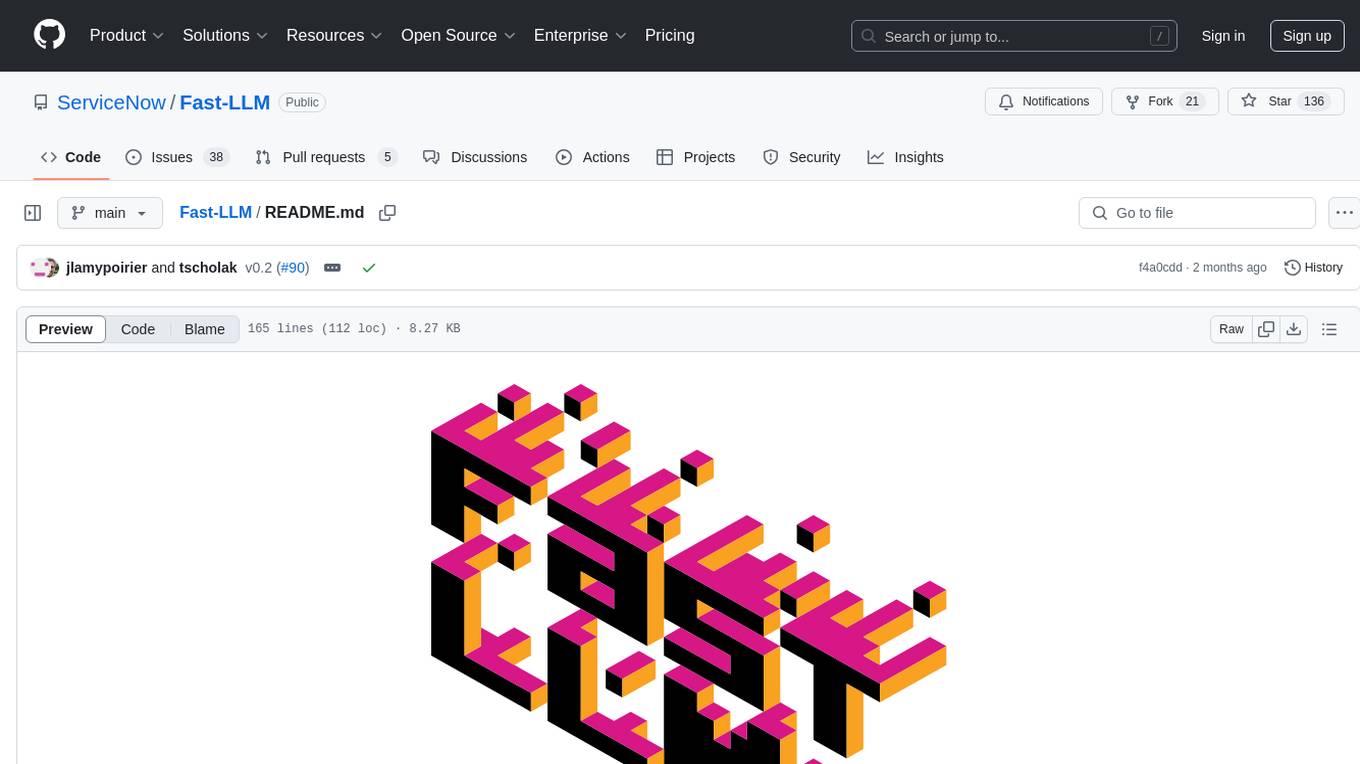
Fast-LLM
Fast-LLM is an open-source library designed for training large language models with exceptional speed, scalability, and flexibility. Built on PyTorch and Triton, it offers optimized kernel efficiency, reduced overheads, and memory usage, making it suitable for training models of all sizes. The library supports distributed training across multiple GPUs and nodes, offers flexibility in model architectures, and is easy to use with pre-built Docker images and simple configuration. Fast-LLM is licensed under Apache 2.0, developed transparently on GitHub, and encourages contributions and collaboration from the community.
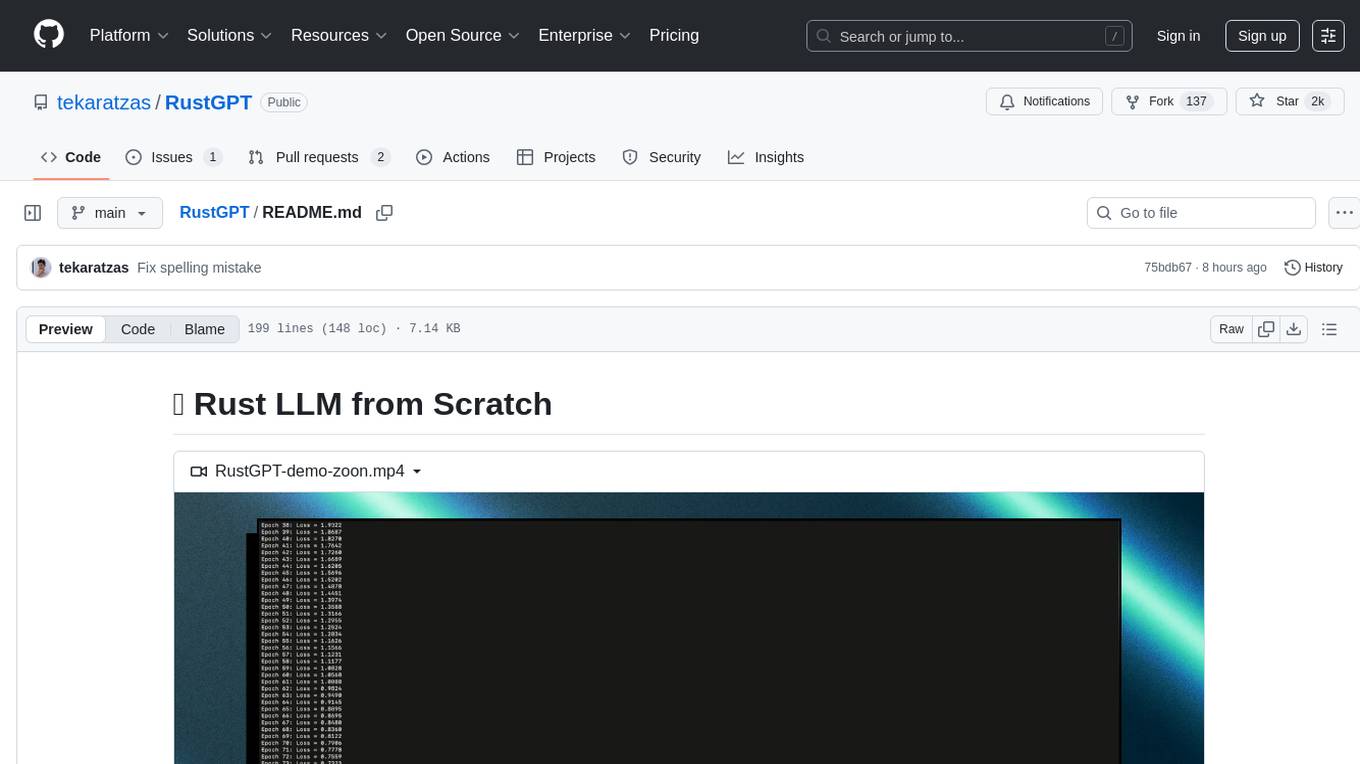
RustGPT
A complete Large Language Model implementation in pure Rust with no external ML frameworks. Demonstrates building a transformer-based language model from scratch, including pre-training, instruction tuning, interactive chat mode, full backpropagation, and modular architecture. Model learns basic world knowledge and conversational patterns. Features custom tokenization, greedy decoding, gradient clipping, modular layer system, and comprehensive test coverage. Ideal for understanding modern LLMs and key ML concepts. Dependencies include ndarray for matrix operations and rand for random number generation. Contributions welcome for model persistence, performance optimizations, better sampling, evaluation metrics, advanced architectures, training improvements, data handling, and model analysis. Follows standard Rust conventions and encourages contributions at beginner, intermediate, and advanced levels.
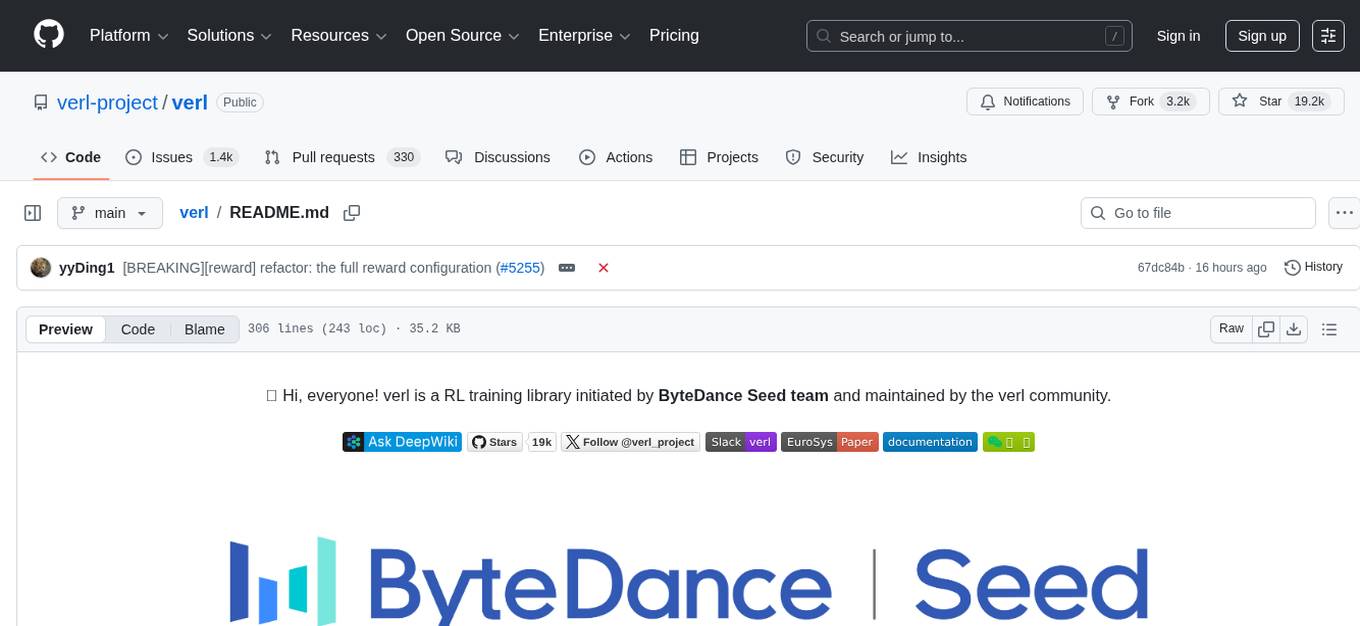
verl
verl is a flexible and efficient RL training library for large language models (LLMs). It offers easy extension of diverse RL algorithms, seamless integration with existing LLM infra, flexible device mapping, and integration with popular Hugging Face models. The library provides state-of-the-art throughput, efficient actor model resharding, and supports various RL algorithms like PPO, GRPO, and more. It also supports model-based and function-based rewards for tasks like math and coding, vision-language models, and multi-modal RL. verl is used for tasks like training large language models, reasoning tasks, reinforcement learning with diverse algorithms, and multi-modal RL.
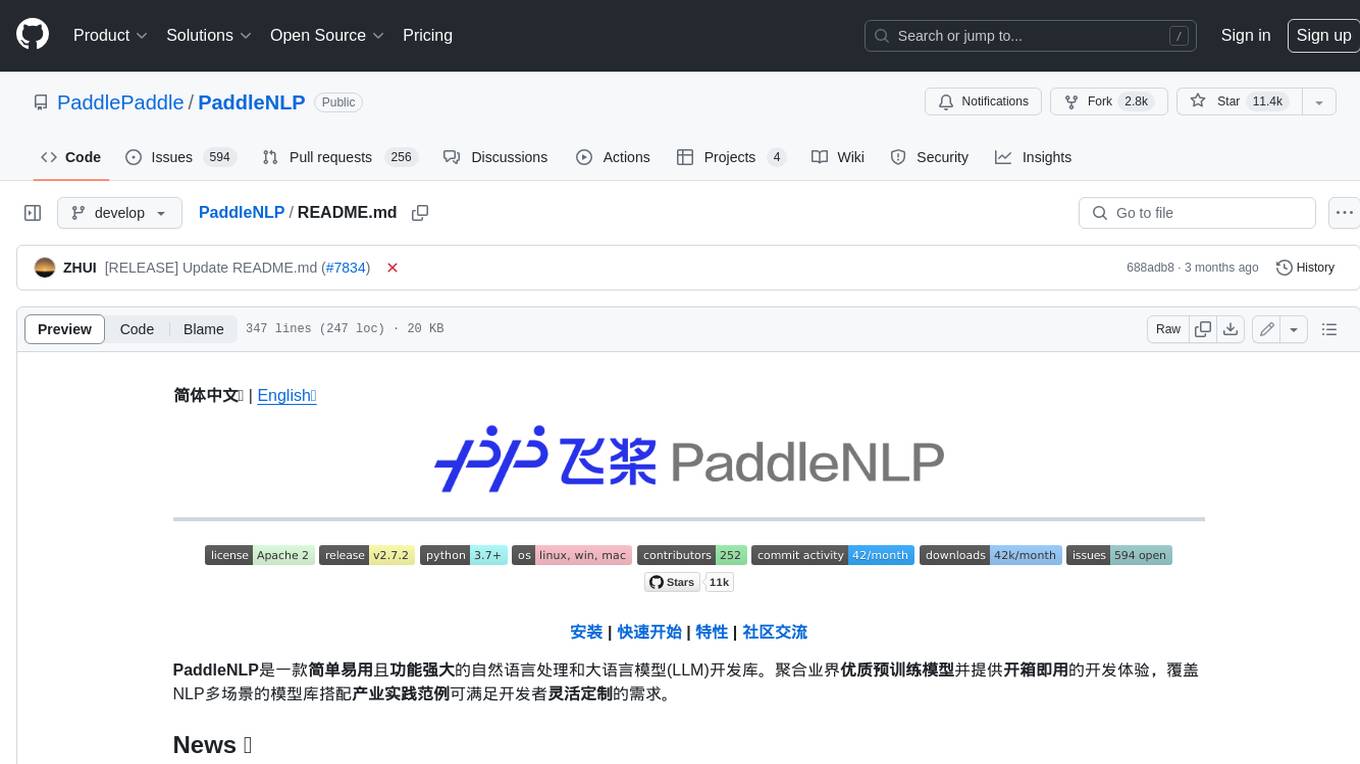
PaddleNLP
PaddleNLP is an easy-to-use and high-performance NLP library. It aggregates high-quality pre-trained models in the industry and provides out-of-the-box development experience, covering a model library for multiple NLP scenarios with industry practice examples to meet developers' flexible customization needs.
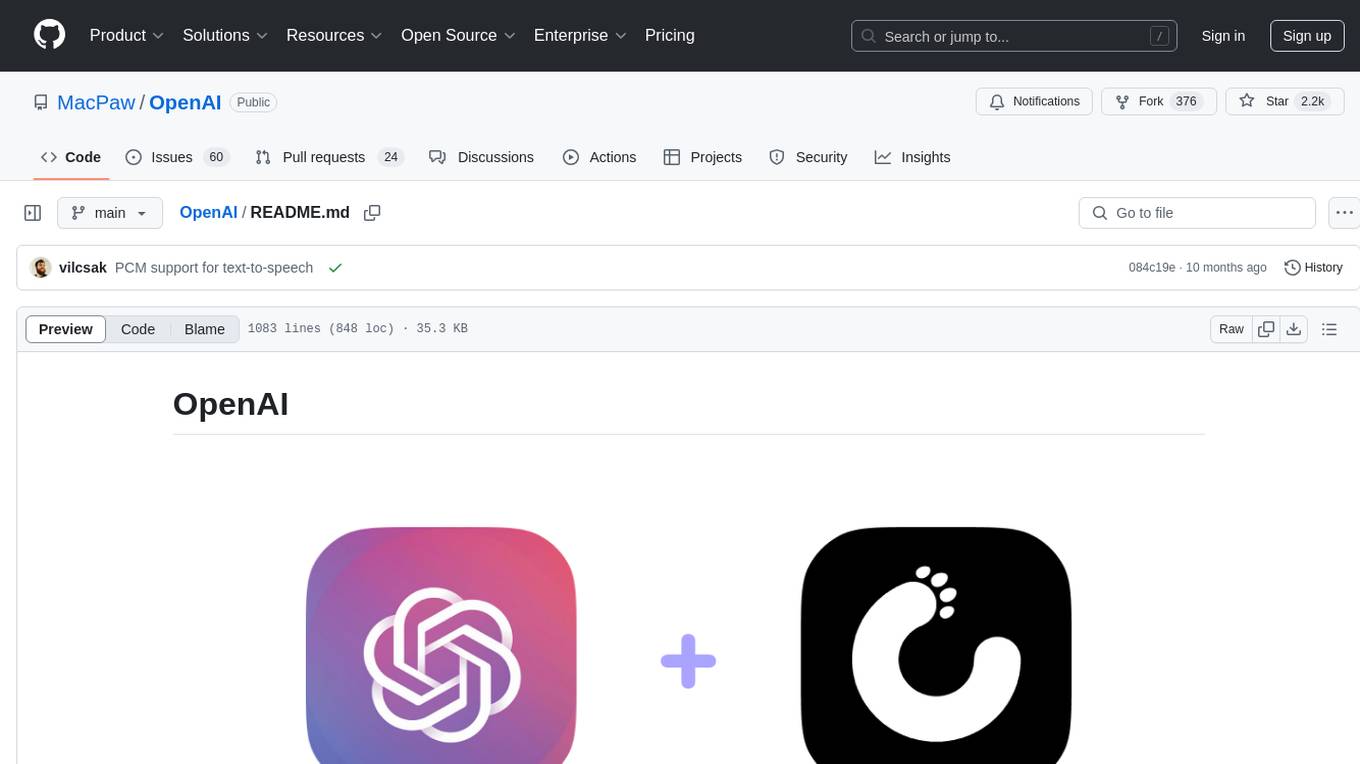
OpenAI
OpenAI is a Swift community-maintained implementation over OpenAI public API. It is a non-profit artificial intelligence research organization founded in San Francisco, California in 2015. OpenAI's mission is to ensure safe and responsible use of AI for civic good, economic growth, and other public benefits. The repository provides functionalities for text completions, chats, image generation, audio processing, edits, embeddings, models, moderations, utilities, and Combine extensions.

llm
The 'llm' package for Emacs provides an interface for interacting with Large Language Models (LLMs). It abstracts functionality to a higher level, concealing API variations and ensuring compatibility with various LLMs. Users can set up providers like OpenAI, Gemini, Vertex, Claude, Ollama, GPT4All, and a fake client for testing. The package allows for chat interactions, embeddings, token counting, and function calling. It also offers advanced prompt creation and logging capabilities. Users can handle conversations, create prompts with placeholders, and contribute by creating providers.
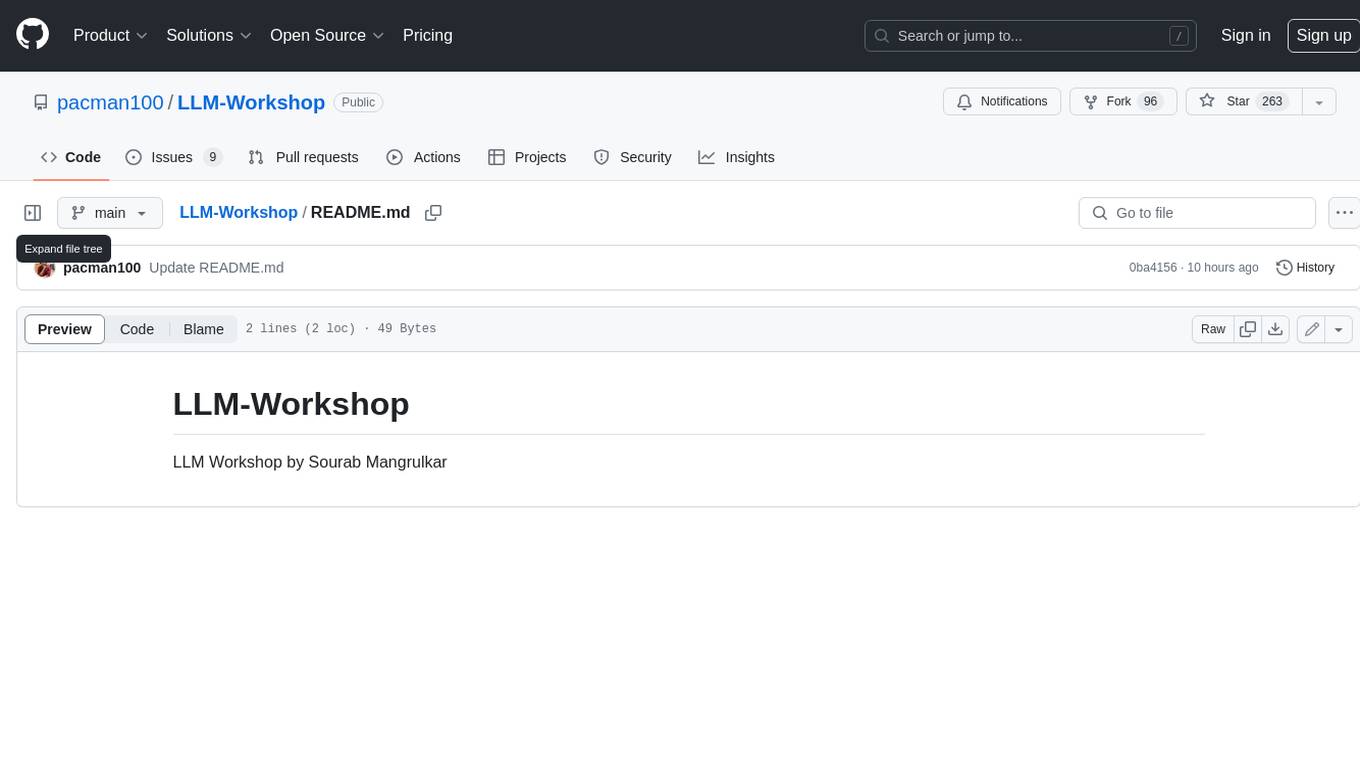
LLM-Workshop
This repository contains a collection of resources for learning about and using Large Language Models (LLMs). The resources include tutorials, code examples, and links to additional resources. LLMs are a type of artificial intelligence that can understand and generate human-like text. They have a wide range of potential applications, including natural language processing, machine translation, and chatbot development.
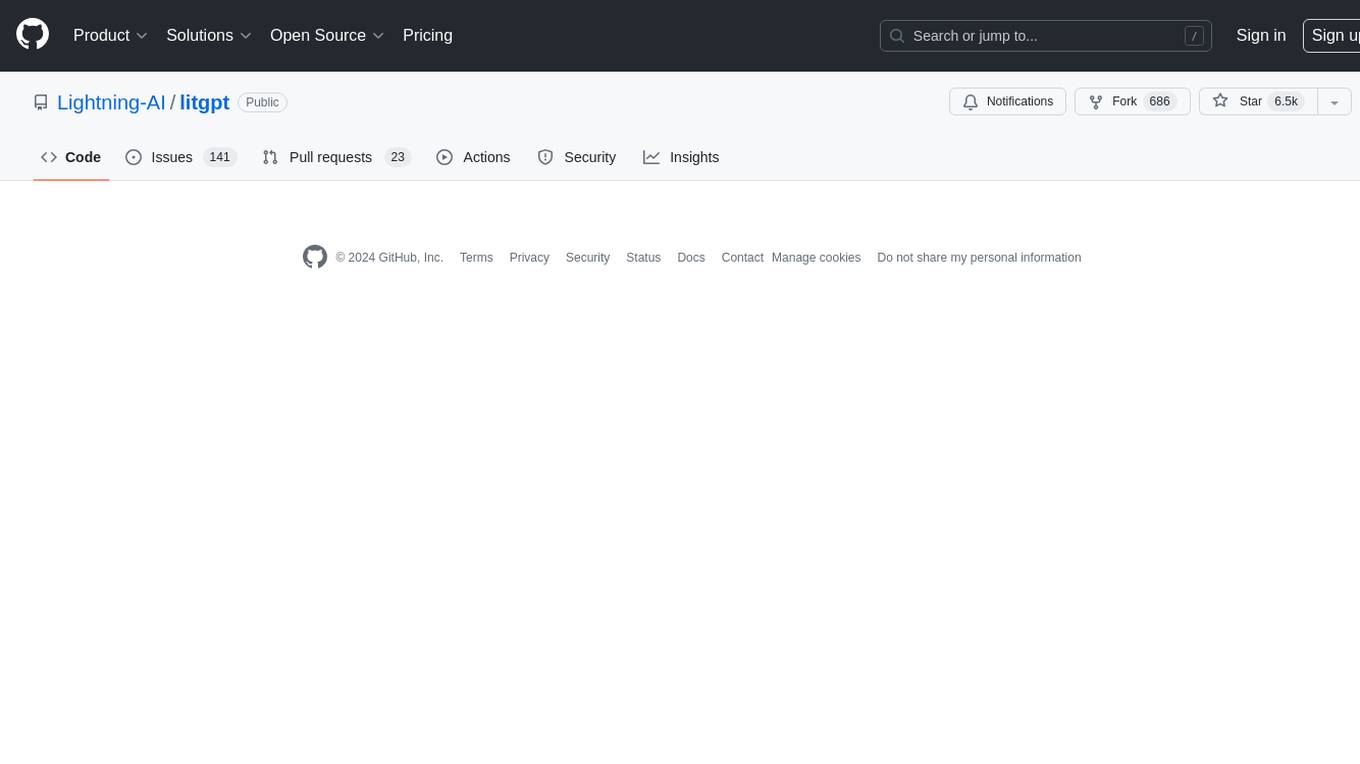
litgpt
LitGPT is a command-line tool designed to easily finetune, pretrain, evaluate, and deploy 20+ LLMs **on your own data**. It features highly-optimized training recipes for the world's most powerful open-source large-language-models (LLMs).
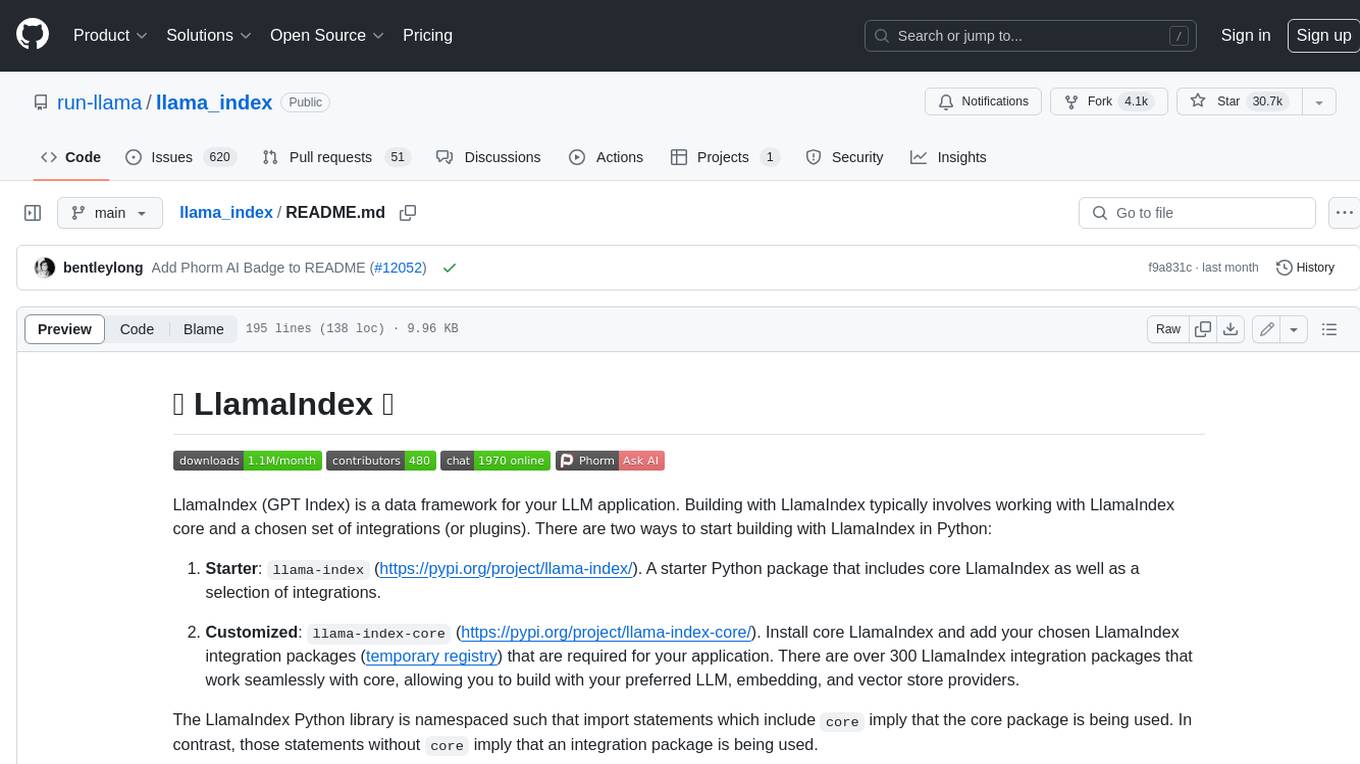
llama_index
LlamaIndex is a data framework for building LLM applications. It provides tools for ingesting, structuring, and querying data, as well as integrating with LLMs and other tools. LlamaIndex is designed to be easy to use for both beginner and advanced users, and it provides a comprehensive set of features for building LLM applications.
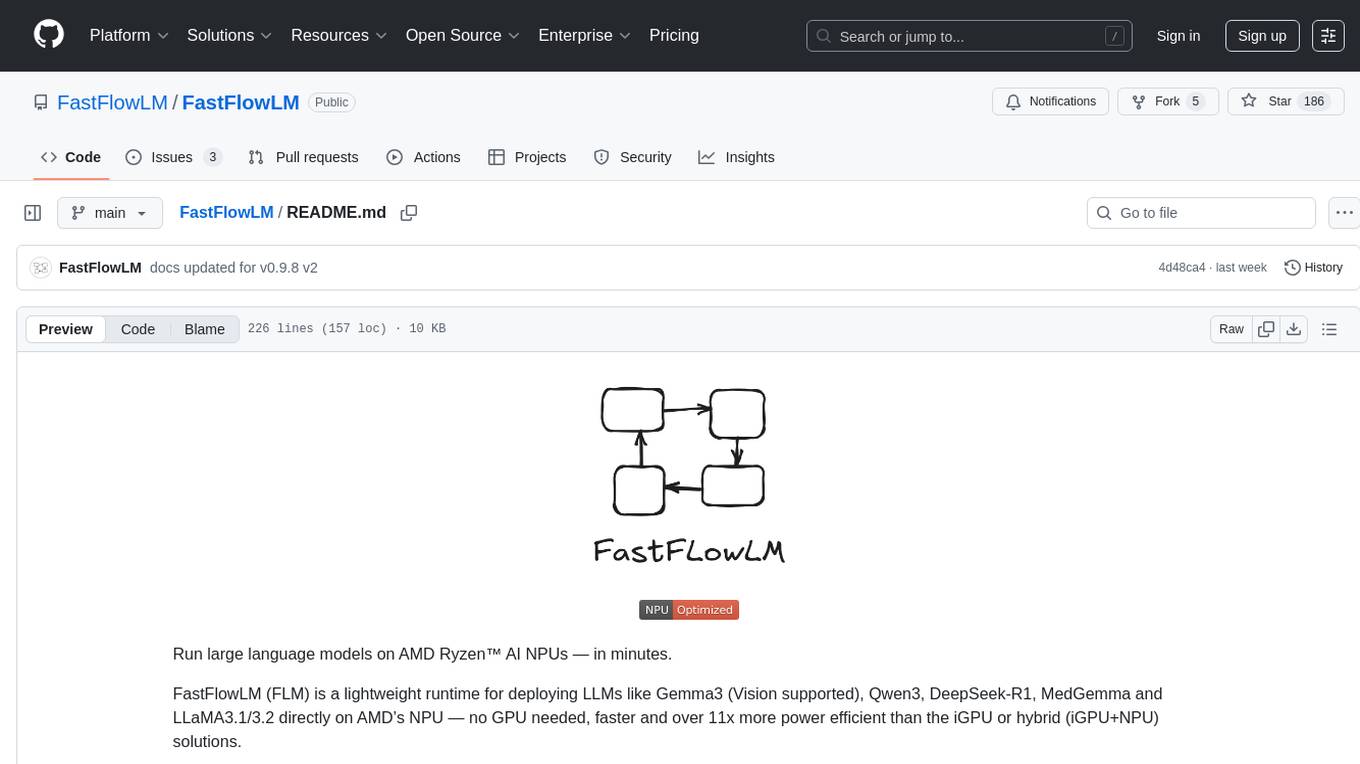
FastFlowLM
FastFlowLM is a Python library for efficient and scalable language model inference. It provides a high-performance implementation of language model scoring using n-gram language models. The library is designed to handle large-scale text data and can be easily integrated into natural language processing pipelines for tasks such as text generation, speech recognition, and machine translation. FastFlowLM is optimized for speed and memory efficiency, making it suitable for both research and production environments.
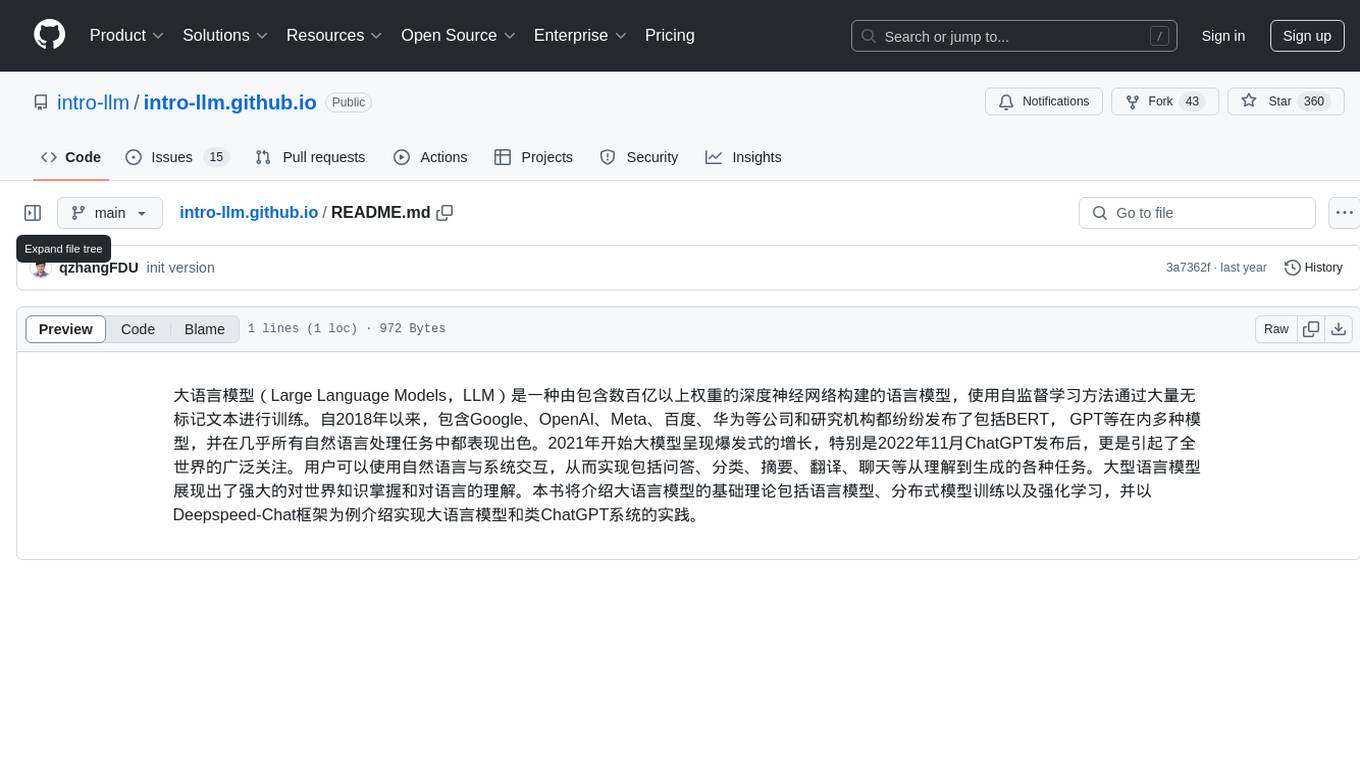
intro-llm.github.io
Large Language Models (LLM) are language models built by deep neural networks containing hundreds of billions of weights, trained on a large amount of unlabeled text using self-supervised learning methods. Since 2018, companies and research institutions including Google, OpenAI, Meta, Baidu, and Huawei have released various models such as BERT, GPT, etc., which have performed well in almost all natural language processing tasks. Starting in 2021, large models have shown explosive growth, especially after the release of ChatGPT in November 2022, attracting worldwide attention. Users can interact with systems using natural language to achieve various tasks from understanding to generation, including question answering, classification, summarization, translation, and chat. Large language models demonstrate powerful knowledge of the world and understanding of language. This repository introduces the basic theory of large language models including language models, distributed model training, and reinforcement learning, and uses the Deepspeed-Chat framework as an example to introduce the implementation of large language models and ChatGPT-like systems.
For similar tasks
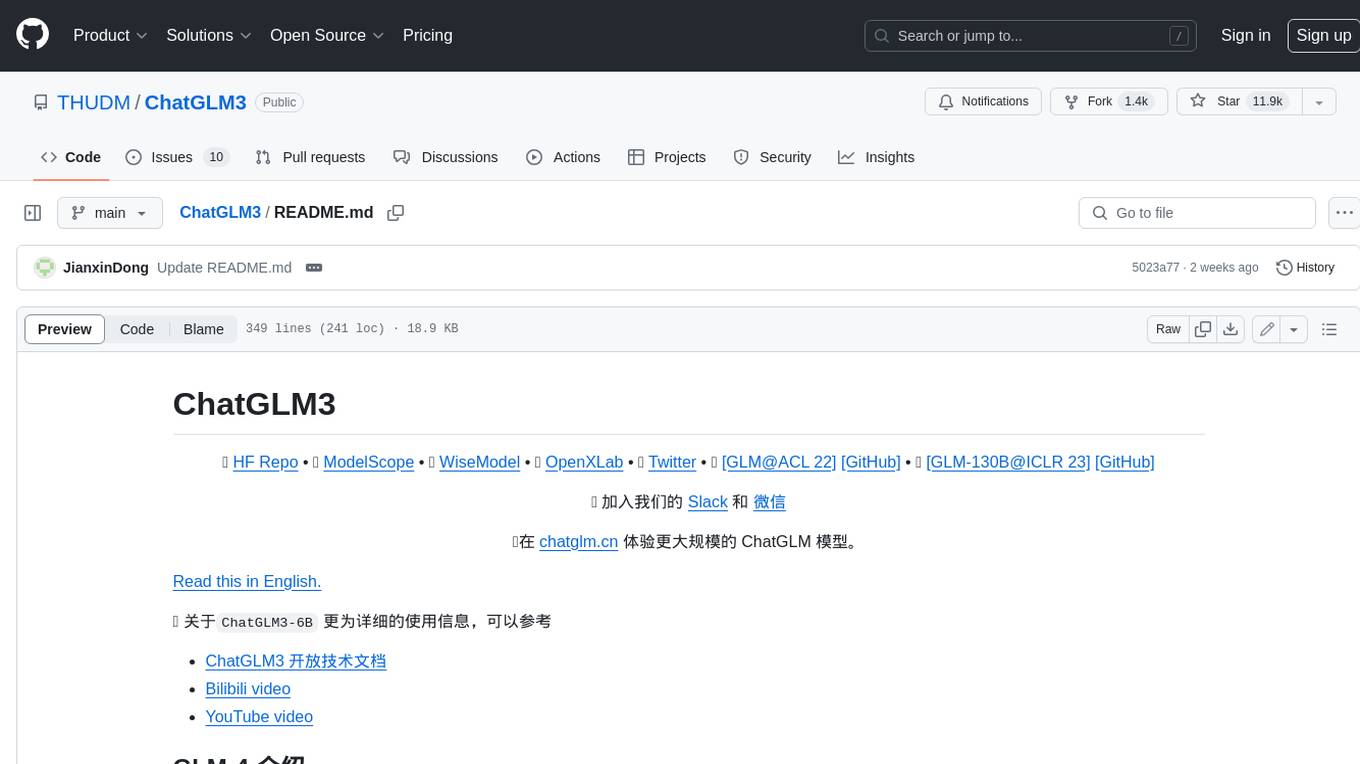
ChatGLM3
ChatGLM3 is a conversational pretrained model jointly released by Zhipu AI and THU's KEG Lab. ChatGLM3-6B is the open-sourced model in the ChatGLM3 series. It inherits the advantages of its predecessors, such as fluent conversation and low deployment threshold. In addition, ChatGLM3-6B introduces the following features: 1. A stronger foundation model: ChatGLM3-6B's foundation model ChatGLM3-6B-Base employs more diverse training data, more sufficient training steps, and more reasonable training strategies. Evaluation on datasets from different perspectives, such as semantics, mathematics, reasoning, code, and knowledge, shows that ChatGLM3-6B-Base has the strongest performance among foundation models below 10B parameters. 2. More complete functional support: ChatGLM3-6B adopts a newly designed prompt format, which supports not only normal multi-turn dialogue, but also complex scenarios such as tool invocation (Function Call), code execution (Code Interpreter), and Agent tasks. 3. A more comprehensive open-source sequence: In addition to the dialogue model ChatGLM3-6B, the foundation model ChatGLM3-6B-Base, the long-text dialogue model ChatGLM3-6B-32K, and ChatGLM3-6B-128K, which further enhances the long-text comprehension ability, are also open-sourced. All the above weights are completely open to academic research and are also allowed for free commercial use after filling out a questionnaire.

rtp-llm
**rtp-llm** is a Large Language Model (LLM) inference acceleration engine developed by Alibaba's Foundation Model Inference Team. It is widely used within Alibaba Group, supporting LLM service across multiple business units including Taobao, Tmall, Idlefish, Cainiao, Amap, Ele.me, AE, and Lazada. The rtp-llm project is a sub-project of the havenask.
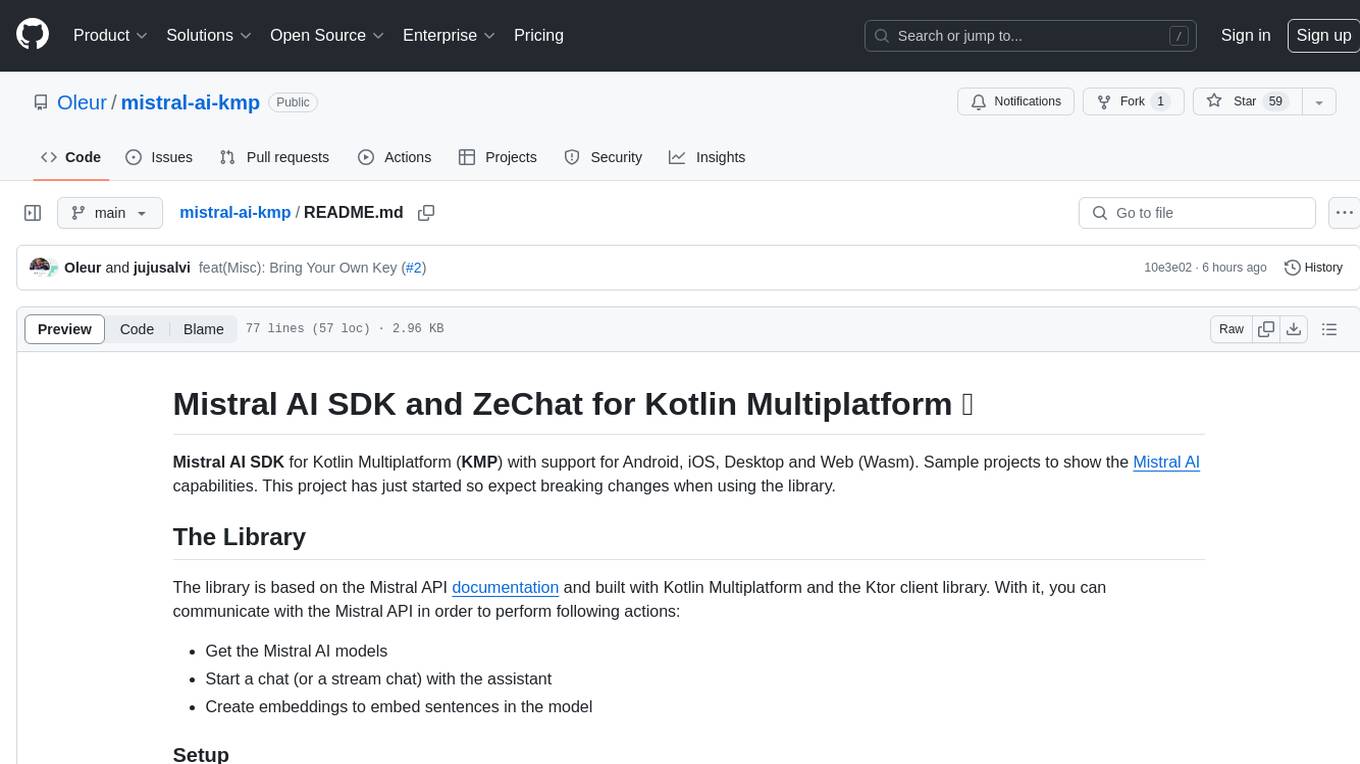
mistral-ai-kmp
Mistral AI SDK for Kotlin Multiplatform (KMP) allows communication with Mistral API to get AI models, start a chat with the assistant, and create embeddings. The library is based on Mistral API documentation and built with Kotlin Multiplatform and Ktor client library. Sample projects like ZeChat showcase the capabilities of Mistral AI SDK. Users can interact with different Mistral AI models through ZeChat apps on Android, Desktop, and Web platforms. The library is not yet published on Maven, but users can fork the project and use it as a module dependency in their apps.

ai-guide
This guide is dedicated to Large Language Models (LLMs) that you can run on your home computer. It assumes your PC is a lower-end, non-gaming setup.

onnxruntime-genai
ONNX Runtime Generative AI is a library that provides the generative AI loop for ONNX models, including inference with ONNX Runtime, logits processing, search and sampling, and KV cache management. Users can call a high level `generate()` method, or run each iteration of the model in a loop. It supports greedy/beam search and TopP, TopK sampling to generate token sequences, has built in logits processing like repetition penalties, and allows for easy custom scoring.

khoj
Khoj is an open-source, personal AI assistant that extends your capabilities by creating always-available AI agents. You can share your notes and documents to extend your digital brain, and your AI agents have access to the internet, allowing you to incorporate real-time information. Khoj is accessible on Desktop, Emacs, Obsidian, Web, and Whatsapp, and you can share PDF, markdown, org-mode, notion files, and GitHub repositories. You'll get fast, accurate semantic search on top of your docs, and your agents can create deeply personal images and understand your speech. Khoj is self-hostable and always will be.

langchain_dart
LangChain.dart is a Dart port of the popular LangChain Python framework created by Harrison Chase. LangChain provides a set of ready-to-use components for working with language models and a standard interface for chaining them together to formulate more advanced use cases (e.g. chatbots, Q&A with RAG, agents, summarization, extraction, etc.). The components can be grouped into a few core modules: * **Model I/O:** LangChain offers a unified API for interacting with various LLM providers (e.g. OpenAI, Google, Mistral, Ollama, etc.), allowing developers to switch between them with ease. Additionally, it provides tools for managing model inputs (prompt templates and example selectors) and parsing the resulting model outputs (output parsers). * **Retrieval:** assists in loading user data (via document loaders), transforming it (with text splitters), extracting its meaning (using embedding models), storing (in vector stores) and retrieving it (through retrievers) so that it can be used to ground the model's responses (i.e. Retrieval-Augmented Generation or RAG). * **Agents:** "bots" that leverage LLMs to make informed decisions about which available tools (such as web search, calculators, database lookup, etc.) to use to accomplish the designated task. The different components can be composed together using the LangChain Expression Language (LCEL).
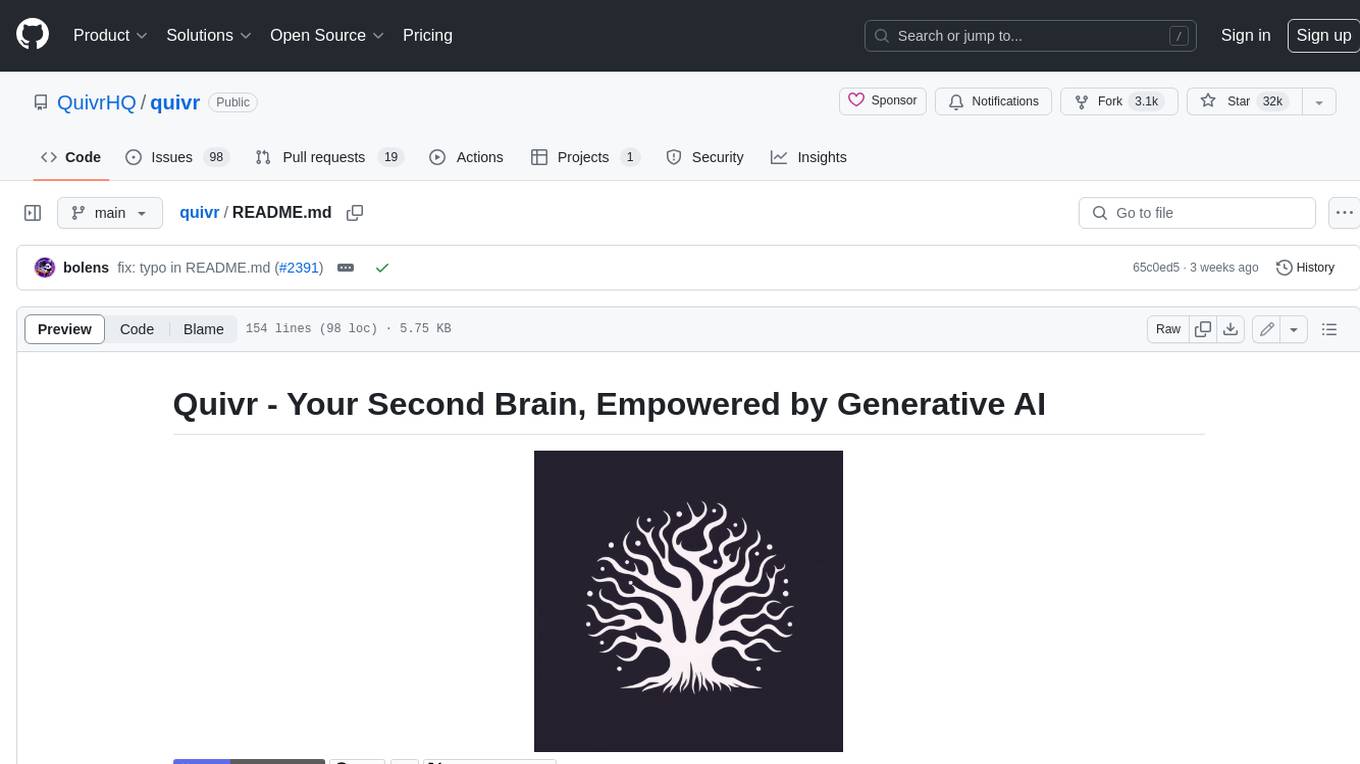
quivr
Quivr is a personal assistant powered by Generative AI, designed to be a second brain for users. It offers fast and efficient access to data, ensuring security and compatibility with various file formats. Quivr is open source and free to use, allowing users to share their brains publicly or keep them private. The marketplace feature enables users to share and utilize brains created by others, boosting productivity. Quivr's offline mode provides anytime, anywhere access to data. Key features include speed, security, OS compatibility, file compatibility, open source nature, public/private sharing options, a marketplace, and offline mode.
For similar jobs

h2ogpt
h2oGPT is an Apache V2 open-source project that allows users to query and summarize documents or chat with local private GPT LLMs. It features a private offline database of any documents (PDFs, Excel, Word, Images, Video Frames, Youtube, Audio, Code, Text, MarkDown, etc.), a persistent database (Chroma, Weaviate, or in-memory FAISS) using accurate embeddings (instructor-large, all-MiniLM-L6-v2, etc.), and efficient use of context using instruct-tuned LLMs (no need for LangChain's few-shot approach). h2oGPT also offers parallel summarization and extraction, reaching an output of 80 tokens per second with the 13B LLaMa2 model, HYDE (Hypothetical Document Embeddings) for enhanced retrieval based upon LLM responses, a variety of models supported (LLaMa2, Mistral, Falcon, Vicuna, WizardLM. With AutoGPTQ, 4-bit/8-bit, LORA, etc.), GPU support from HF and LLaMa.cpp GGML models, and CPU support using HF, LLaMa.cpp, and GPT4ALL models. Additionally, h2oGPT provides Attention Sinks for arbitrarily long generation (LLaMa-2, Mistral, MPT, Pythia, Falcon, etc.), a UI or CLI with streaming of all models, the ability to upload and view documents through the UI (control multiple collaborative or personal collections), Vision Models LLaVa, Claude-3, Gemini-Pro-Vision, GPT-4-Vision, Image Generation Stable Diffusion (sdxl-turbo, sdxl) and PlaygroundAI (playv2), Voice STT using Whisper with streaming audio conversion, Voice TTS using MIT-Licensed Microsoft Speech T5 with multiple voices and Streaming audio conversion, Voice TTS using MPL2-Licensed TTS including Voice Cloning and Streaming audio conversion, AI Assistant Voice Control Mode for hands-free control of h2oGPT chat, Bake-off UI mode against many models at the same time, Easy Download of model artifacts and control over models like LLaMa.cpp through the UI, Authentication in the UI by user/password via Native or Google OAuth, State Preservation in the UI by user/password, Linux, Docker, macOS, and Windows support, Easy Windows Installer for Windows 10 64-bit (CPU/CUDA), Easy macOS Installer for macOS (CPU/M1/M2), Inference Servers support (oLLaMa, HF TGI server, vLLM, Gradio, ExLLaMa, Replicate, OpenAI, Azure OpenAI, Anthropic), OpenAI-compliant, Server Proxy API (h2oGPT acts as drop-in-replacement to OpenAI server), Python client API (to talk to Gradio server), JSON Mode with any model via code block extraction. Also supports MistralAI JSON mode, Claude-3 via function calling with strict Schema, OpenAI via JSON mode, and vLLM via guided_json with strict Schema, Web-Search integration with Chat and Document Q/A, Agents for Search, Document Q/A, Python Code, CSV frames (Experimental, best with OpenAI currently), Evaluate performance using reward models, and Quality maintained with over 1000 unit and integration tests taking over 4 GPU-hours.

mistral.rs
Mistral.rs is a fast LLM inference platform written in Rust. We support inference on a variety of devices, quantization, and easy-to-use application with an Open-AI API compatible HTTP server and Python bindings.
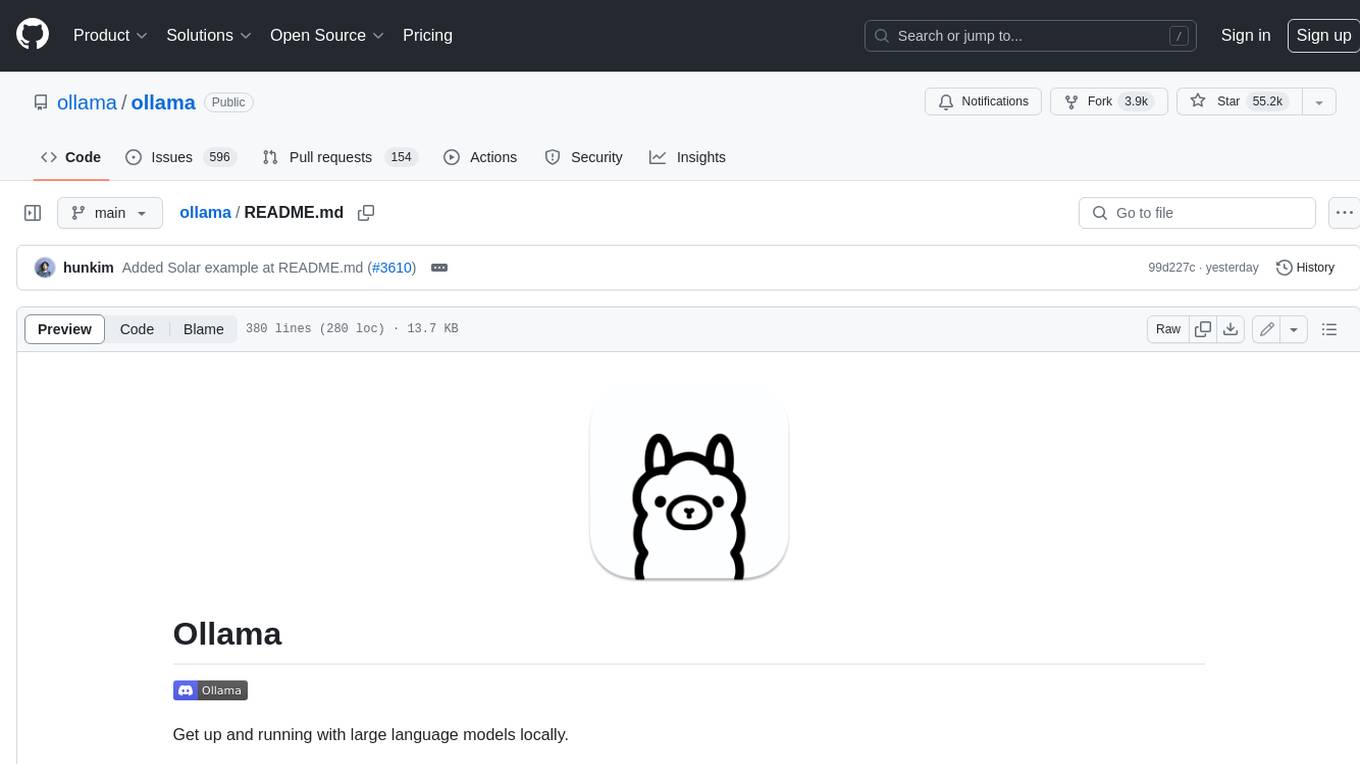
ollama
Ollama is a lightweight, extensible framework for building and running language models on the local machine. It provides a simple API for creating, running, and managing models, as well as a library of pre-built models that can be easily used in a variety of applications. Ollama is designed to be easy to use and accessible to developers of all levels. It is open source and available for free on GitHub.
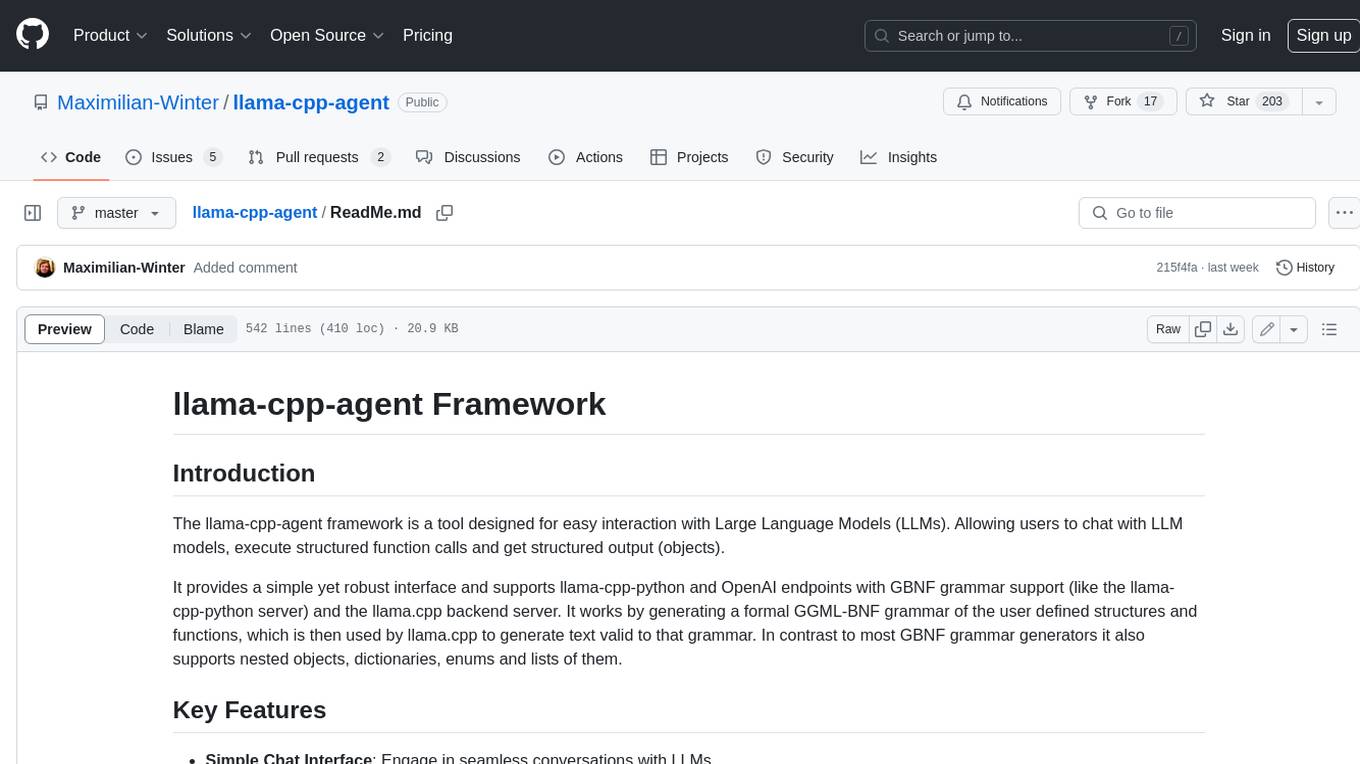
llama-cpp-agent
The llama-cpp-agent framework is a tool designed for easy interaction with Large Language Models (LLMs). Allowing users to chat with LLM models, execute structured function calls and get structured output (objects). It provides a simple yet robust interface and supports llama-cpp-python and OpenAI endpoints with GBNF grammar support (like the llama-cpp-python server) and the llama.cpp backend server. It works by generating a formal GGML-BNF grammar of the user defined structures and functions, which is then used by llama.cpp to generate text valid to that grammar. In contrast to most GBNF grammar generators it also supports nested objects, dictionaries, enums and lists of them.
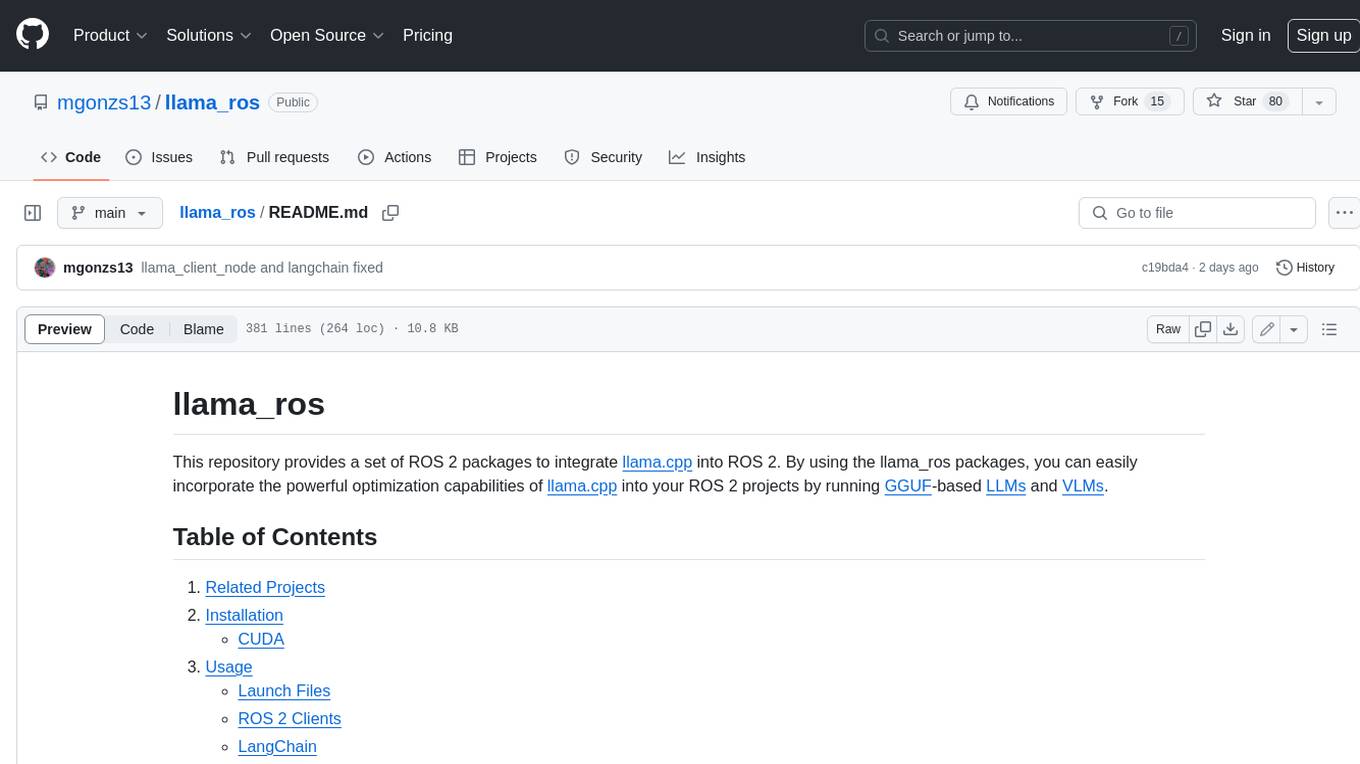
llama_ros
This repository provides a set of ROS 2 packages to integrate llama.cpp into ROS 2. By using the llama_ros packages, you can easily incorporate the powerful optimization capabilities of llama.cpp into your ROS 2 projects by running GGUF-based LLMs and VLMs.
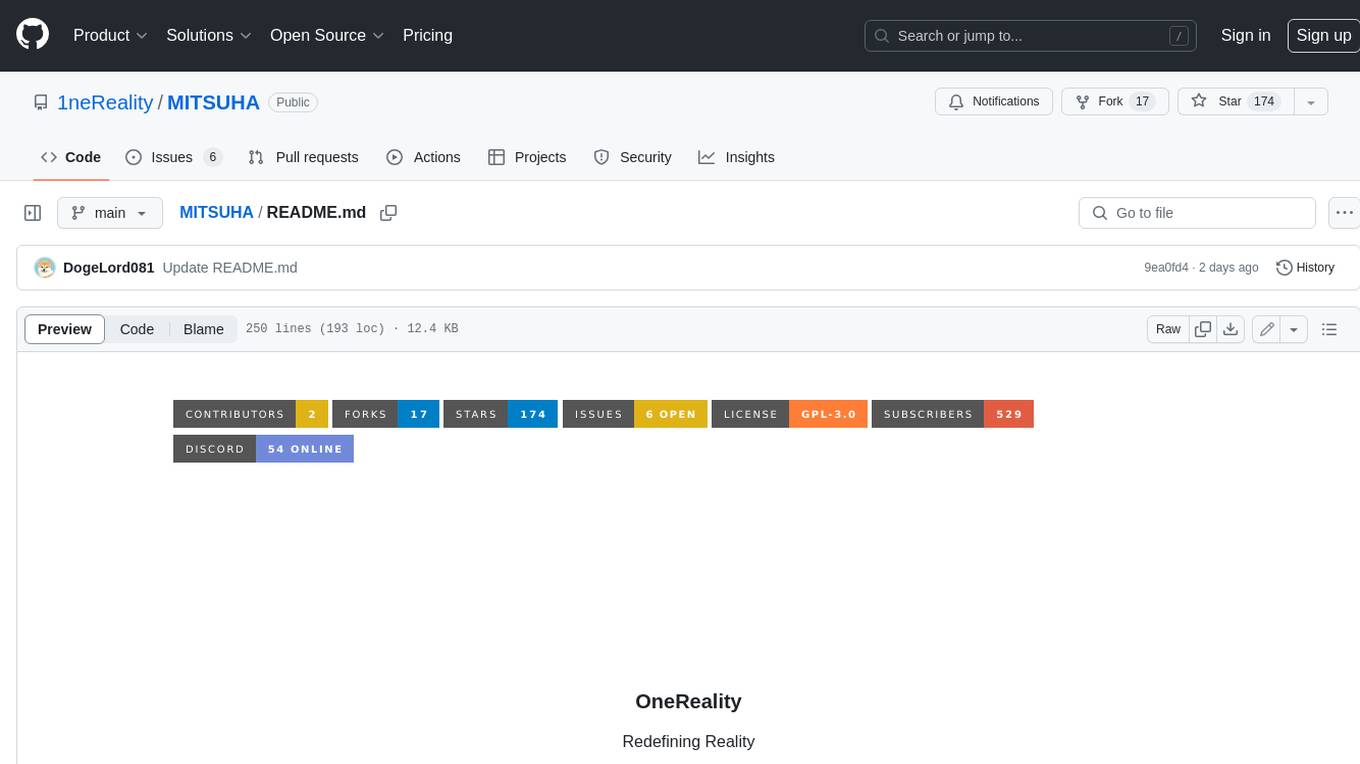
MITSUHA
OneReality is a virtual waifu/assistant that you can speak to through your mic and it'll speak back to you! It has many features such as: * You can speak to her with a mic * It can speak back to you * Has short-term memory and long-term memory * Can open apps * Smarter than you * Fluent in English, Japanese, Korean, and Chinese * Can control your smart home like Alexa if you set up Tuya (more info in Prerequisites) It is built with Python, Llama-cpp-python, Whisper, SpeechRecognition, PocketSphinx, VITS-fast-fine-tuning, VITS-simple-api, HyperDB, Sentence Transformers, and Tuya Cloud IoT.
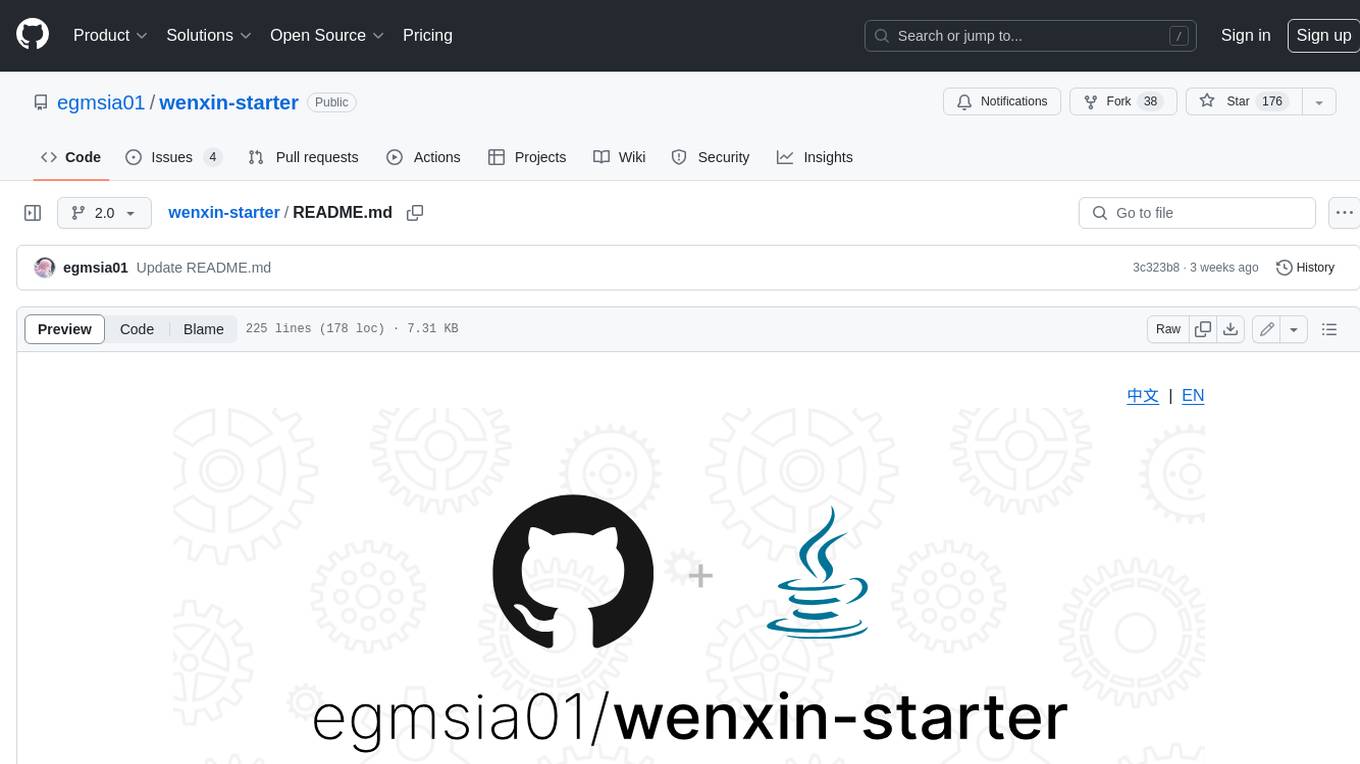
wenxin-starter
WenXin-Starter is a spring-boot-starter for Baidu's "Wenxin Qianfan WENXINWORKSHOP" large model, which can help you quickly access Baidu's AI capabilities. It fully integrates the official API documentation of Wenxin Qianfan. Supports text-to-image generation, built-in dialogue memory, and supports streaming return of dialogue. Supports QPS control of a single model and supports queuing mechanism. Plugins will be added soon.
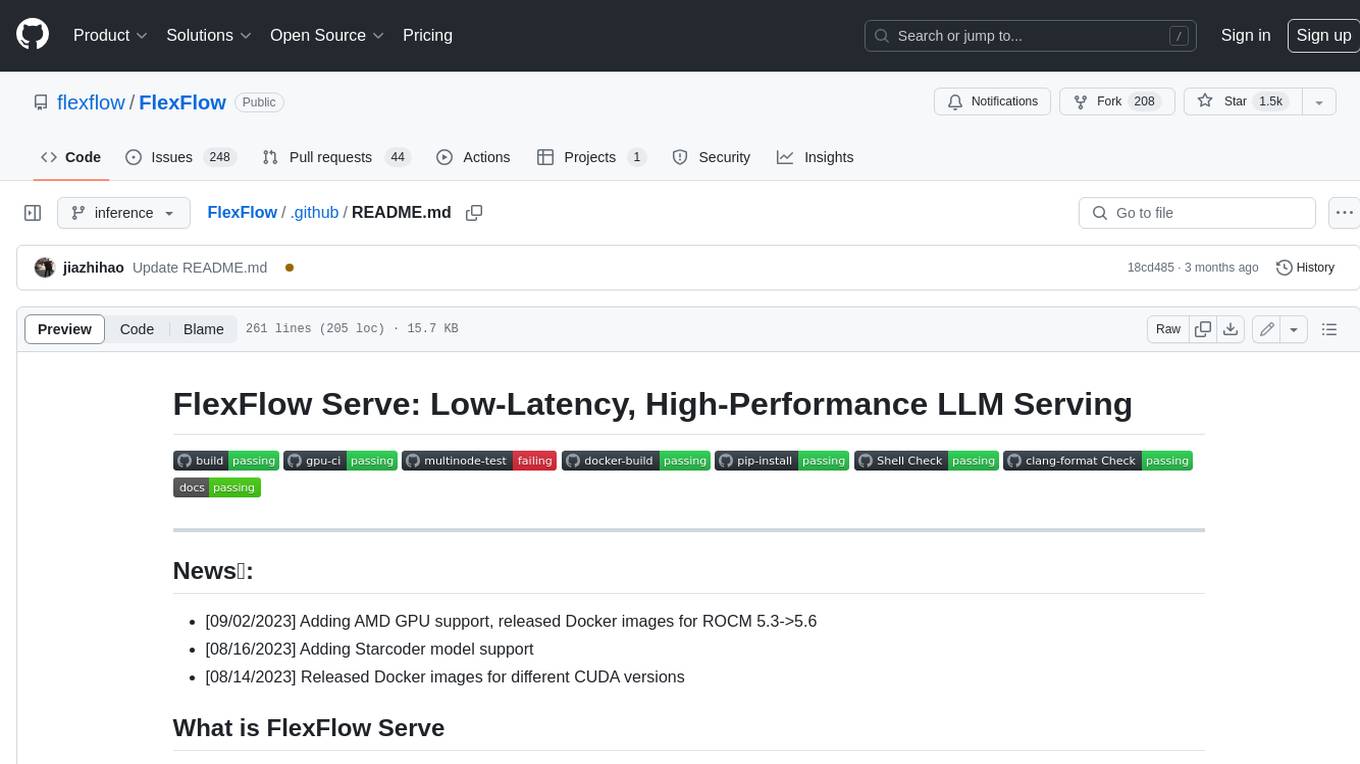
FlexFlow
FlexFlow Serve is an open-source compiler and distributed system for **low latency**, **high performance** LLM serving. FlexFlow Serve outperforms existing systems by 1.3-2.0x for single-node, multi-GPU inference and by 1.4-2.4x for multi-node, multi-GPU inference.

